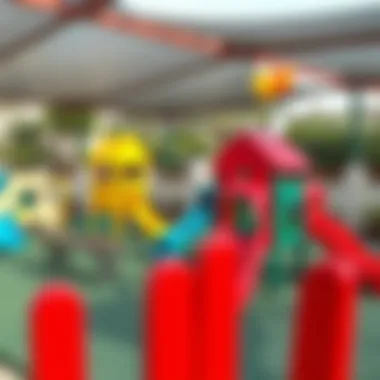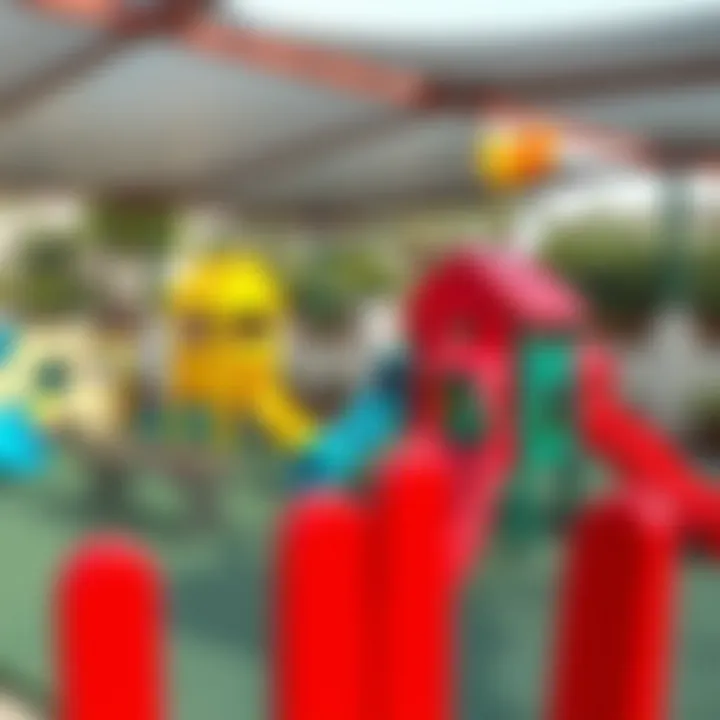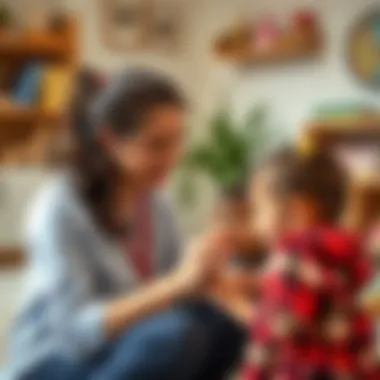Exploring Nursery Facilities in Mussafah


Intro
In the bustling heart of Abu Dhabi, Mussafah is transforming into a vibrant hub for families. With its array of nursery facilities, this area caters to the growing needs of parents seeking early childhood education for their little ones. However, the question remains: how does one navigate this landscape filled with various options, philosophies, and facilities? This article aims to provide a comprehensive look into the nursery scene in Mussafah, highlighting what you need to know to make an informed choice for your child's first educational experience.
Market Trends
Current Market Analysis
The nursery market in Mussafah has experienced noticeable growth in recent years, driven by an influx of families attracted to the region. Many nurseries now offer diverse programs tailored to the developmental stages of young children, ranging from infants to pre-schoolers. The facilities are not just places for care; they are designed to foster a child's cognitive, social, and emotional growth.
Recent statistics indicate that approximately 40% of families in Mussafah enroll their children in nursery programs, highlighting the increasing importance placed on early education. With a mixture of international and local nurseries, parents have access to a spectrum of educational philosophies: from Montessori to traditional curriculums, each offering unique benefits.
Furthermore, discerning parents are not just looking at educational programs; they are placing significant weight on staff qualifications and caregiver-child ratios, crucial factors that directly impact a child’s learning experience.
Future Projections
Looking ahead, the demand for nursery facilities is poised to rise even further. Analysts predict a 15% increase in enrollment over the next five years, as local demographics shift and more expatriates settle in the area. As a response, existing nurseries are expanding their capabilities, incorporating advanced learning methodologies and technological integrations to enhance their educational framework.
Moreover, community awareness regarding the importance of early childhood development is accelerating, pushing more parents to invest in quality nursery education. This trend promises to foster healthier developmental outcomes for children and greater educational resources for families in Mussafah.
Property Insights
Neighborhood Comparisons
Mussafah is characterized by a melange of neighborhoods, each presenting its own flavor when it comes to nursery facilities. For example, the industrial areas may seem less appealing for education compared to the residential zones. However, many nurseries operating out of the industrial district have made significant investments in creating welcoming environments that prioritize safety and learning.
Families living in residential neighborhoods like Al Mushrif or Al Dhafra tend to have access to some of the most sought-after nurseries, often due to their proximity to parks and recreational areas. The ease of access to outdoor spaces can play a critical role in choosing a nursery, as many programs incorporate outdoor activities as part of their curriculum.
Property Types Explained
Nursery facilities typically fall into a few distinct categories:
- Private Nurseries: These are independently owned and operated, often featuring unique curriculums that cater to specific educational philosophies.
- Franchise Nurseries: Established franchises offer a standardized curriculum, backed by a well-recognized brand. They provide consistency in approach, often reassuring parents in their choice.
- Non-Profit Nurseries: Funded through community contributions and grants, these can offer more affordable options, though availability is often limited.
As a parent, understanding these various property types and their implications on education and environment can play a vital role in your decision-making process.
"Choosing the right nursery is not just about care; it's about fostering growth, creativity, and confidence in a child’s early years."
Overview of the Nursery Scene in Mussafah
Understanding the nursery landscape in Mussafah is crucial for parents, caregivers, and even investors aiming to navigate early childhood education. Nurseries play a significant role in shaping children's formative years, and the choices available in Mussafah reflect a mix of cultural influences and educational philosophies. Delving into this not only helps parents make informed decisions but also sheds light on the educational trends shaping the future of the region.
Historical Context of Early Childhood Education
The history of early childhood education in Abu Dhabi, particularly in Mussafah, is rooted in the broader Arab values that cherish education as a cornerstone of development. Traditionally, learning started at home, with parents acting as the primary educators. However, with rapid urbanization and modernization, this approach has evolved. In recent decades, the government has recognized the importance of structured early learning environments, leading to an array of nursery facilities.
Over the years, policies have been implemented to improve educational standards, ensuring that children receive a high-quality start to their academic journeys. By the early 2000s, the emergence of private nurseries began to diversify the educational offerings, catering to global standards and the demands of a more cosmopolitan population.
Current State of Nurseries in Mussafah
Today, Mussafah boasts a vibrant tapestry of nursery options that cater to various needs and preferences. From bilingual education to Montessori philosophies, parents can choose from a range of facilities that reflect both local and international influences.
Facilities in this area operate under a mix of public and private governance, creating a competitive environment that drives quality standards. Common features include:
- Safety Protocols: Most nurseries emphasize safety and hygiene, crucial for parents’ peace of mind.
- Educational Philosophy: Nurseries adopt various educational approaches, blending traditional methods with innovative practices to foster learning in a nurturing environment.
- Diverse Curriculum: Some facilities offer specialized programs focusing on art, science, or physical activity, aligning with developmental milestones.
Based on recent enrollments, data shows that many parents in Mussafah are inclined towards private options, often valuing the individual attention their children can receive. However, public nurseries remain a vital part of the educational framework, often providing accessible alternatives for families on a budget.
Understanding these dynamics not only highlights the choices parents face in Mussafah but also gives insights into broader societal shifts that influence early childhood education.
Types of Nursery Facilities Available
Understanding the various types of nursery facilities in Mussafah is crucial for parents navigating early childhood education options. These facilities cater to varied needs, philosophies, and cultural preferences, making it essential to discern the differences. Parents should consider several key elements that affect their child’s development and overall experience in nursery settings. With the growing diversity in teaching models and approaches, this section will dissect the landscape of nurseries available, empowering parents to make informed choices.


Private vs. Public Nurseries
The choice between private and public nurseries is pertinent for many families. Private nurseries typically offer a range of specialized programs and often have more resources to create a tailored learning environment. The fee structures can be substantial, but, as many parents argue, the investment shows through higher caregiver-to-child ratios and potentially superior facilities. That said, public nurseries can provide quality education at a lower cost. They usually follow a standardized curriculum designed by local authorities, ensuring that all children have access to essential learning experiences.
- Benefits of Private Nurseries:
- Benefits of Public Nurseries:
- Specialized curriculums tailored to specific learning styles
- Enhanced facilities, including outdoor spaces and learning materials
- More personalized attention due to smaller class sizes
- Cost-effective option for families
- Close ties with the community and local organizations
- Accessibility for children from diverse economic backgrounds
Montessori and International Programs
Montessori schools, recognized for their child-centered approach, promote self-directed activity and hands-on learning. The philosophy of allowing children to learn at their own pace facilitates intrinsic motivation and fosters independent thought. For families considering international programs, the opportunity to expose children to a global curriculum and diverse cultural experiences may align well with their values. Such programs often emphasize creativity and social interaction within a multicultural environment, preparing children for a more connected world.
- Key Features of Montessori Programs:
- Advantages of International Programs:
- Child-led learning encourages personalization of the educational experience
- Emphasis on collaborative play and real-world tasks
- Development of practical life skills alongside academic learning
- Exposure to multiple languages and cultures from an early age
- Curriculum that prioritizes global citizenry and environmental awareness
- Builds adaptability and social skills in diverse environments
Language and Cultural Focus
Language and cultural focus in nurseries can greatly influence a child’s early development. In a multicultural hub like Mussafah, nurseries often incorporate diverse languages to support bilingual or multilingual development. Programs that emphasize children’s cultural backgrounds facilitate a sense of belonging and nurture a positive identity. Understanding the cultural heritage of students not only enhances social cohesion but also equips them with essential skills for global communication.
- Aspects to Consider:
- Availability of dual-language programs which can boost cognitive abilities
- Cultural celebrations and activities that embrace various heritages
- Integration of local customs in the curriculum which enriches the learning experience
"Choosing a nursery is not just about education; it's about finding the right environment that resonates with your values and expectations for your child's future."
By evaluating the differences in nursery types, parents in Mussafah can better align their choices with their children’s educational needs and family values. This awareness ultimately fosters stronger early childhood experiences that can set the tone for lifelong learning.
Factors to Consider When Choosing a Nursery
Selecting the right nursery is monumental for both children and parents. Mussafah's diverse nursery landscape offers many options, but not every facility suits each child's unique needs. Understanding key elements can make this choice much clearer and help parents feel confident in their decisions.
Location and Accessibility
A nursery's location holds a hefty weight in the decision-making process. Ideally, parents want a nursery close to home or work to facilitate drop-offs and pick-ups without breaking a sweat. Commute times should be considered; kids shouldn't spend an hour in traffic every day. In Mussafah, various facilities are strategically placed near residential areas and major transit hubs.
Accessibility goes beyond mere physical proximity. Parents might consider factors like parking availability and the ease of navigating to the nursery with children's safety in mind. A nursery that is accessible not only ensures convenience but can significantly lessen the daily stress for both parents and children.
Safety and Hygiene Standards
In the context of early childhood education, safety is non-negotiable. Parents must rigorously evaluate the safety and hygiene standards in potential nurseries. Are the premises secure? How are visitors screened? Is there proper fencing and secure entry? In Mussafah, many nurseries adhere to stringent safety regulations, regularly updating their protocols to align with local authority mandates.
Hygiene plays equally a crucial role. Nurseries should maintain clean environments to prevent the spread of germs, especially because children often have weaker immune systems. It’s worth asking about their cleaning schedules and how they manage illness among children. Following these considerations helps ensure that the little ones spend their time in a safe and healthy environment.
Staff Qualifications and Ratios
When it comes to guiding a child's early learning journey, the qualifications of the staff at a nursery can make or break the experience. Parents should delve into the educational background and experience of the caregivers involved in their child's day-to-day activities. In Mussafah, many reputable nurseries prioritize hiring staff who have formal training in early childhood education, alongside a genuine knack for nurturing children.
Furthermore, understanding staff-to-child ratios is paramount. Low ratios often facilitate more substantial individual attention, which means kids can receive the guidance tailored to their learning pace. This aspect is particularly vital for first-time learners, as it allows for strong relationships between caregivers and children. A small cohort of kids can create an environment that fosters a sense of belonging.
Curriculum and Developmental Focus
Not all nurseries offer the same curriculum or developmental focus. Some may take a more structured approach, emphasizing academic essentials, while others may lean towards play-based learning, favoring social skills and emotional growth. Depending on personal values and the educational goals parents wish to set for their children, it is prudent to explore the specific teaching methodologies in use.
In Mussafah, one can find a mix of curriculums including Montessori, Reggio Emilia, and even localized adaptation of international approaches. Parents should assess if these methodologies resonate with the desired developmental focus for their child. Visiting the nursery and observing classes can provide insight into how children are engaged and nurtured in the space.
By weighing these factors—location, safety standards, staff qualifications, and curriculum—parents can make informed decisions that will set their children up for success. Choosing the right nursery in Mussafah transcends mere logistics; it shapes the early foundations of a child’s growth and development.
Exploring Local Market Trends


Understanding the local market trends when it comes to nurseries in Mussafah is crucial for multiple stakeholders, from parents making choices to investors gauging potential growth areas. By examining enrollment rates and demographic shifts in the region, individuals can make informed decisions based on empirical data rather than personal anecdote.
Enrollment Rates and Trends
Enrollment rates in Mussafah’s nursery facilities have shown significant fluctuations over recent years. A variety of factors contribute to these changes, but they generally mirror larger socioeconomic trends. For instance, increased expatriate families moving into the area tends to boost nursery enrollments. Parents often seek early childhood programs that foster bilingual education and intercultural competencies, making these attractive features for nurseries.
A surge in demand can also be seen around the start of new academic years or after school breaks. Such patterns provide insights into seasonal trends that nursery administrators might consider when planning for resources and staffing. According to local statistics from the Abu Dhabi Department of Education, the enrollment ratio in private nurseries has frequently outpaced that of public options, highlighting the preference for private education in the region.
Determining the right timing for enrollment is often contingent upon local traditions, such as Ramadan, which can impact parental choices dramatically. Parents usually prefer to enroll their children prior to such periods, making timely outreach and communication by facilities essential.
Parenting Demographics in Mussafah
The demographics of families in Mussafah present a mosaic that impacts nursery selections. The population consists of a unique blend of nationalities, with a significant number of expatriates.
- Age Distribution: A large percentage of young families with children of nursery age under 5 years old are evidently prevalent in the area.
- Cultural Background: The diverse cultural backdrop leads to varied expectations and preferences in early childhood education. Many parents favor institutions that recognize and celebrate cultural heritage, especially institutions that provide language programs that cater to multiple backgrounds.
- Income Levels: Affordability also plays a role. Families classified within different income sectors typically gravitate toward specific types of nursery facilities, whether they be premium or budget-friendly options.
Such demographics expose the critical need for nurseries to adapt programming, staff training, and engagement strategies to meet the varied expectations of the community.
"Nursery enrollment is not merely a decision; it’s a reflection of the values and aspirations of families."
Collectively, these trends not only enhance insights for parents seeking quality education but also signal opportunities for investors and nursery operators aiming to align their services with the local demand and ethos.
Comparative Analysis of Notable Nurseries
In a landscape as diverse as Mussafah's, the comparative analysis of notable nurseries becomes an essential endeavor for parents and stakeholders alike. Understanding the unique offerings and philosophies of different facilities not only aids in making informed choices but also highlights the vibrant ecosystems that contribute to early childhood development. These analyses can illuminate the varied educational approaches, innovative programs, and overall value that nurseries present to families. When parents consider enrolling their little ones, they seek environments that align with their educational values and practical requirements. Below, we dissect three prominent nursery facilities in Mussafah, focusing on their educational approaches, unique features, and cost-effectiveness.
Facility A: Educational Approach and Offerings
Facility A stands at the forefront with a progressive educational model that integrates play-based learning with structured curriculum. This facility emphasizes not just academic readiness, but the holistic growth of its students. The classrooms are colorful, inviting, and rich with materials that spur creativity and exploration.
- Curricular Highlights:
- Emphasis on social skills through group activities.
- Hands-on projects that foster curiosity and problem-solving.
What sets Facility A apart is its commitment to blending cultural awareness into the learning experience. Children engage with various global traditions through arts and crafts, music, and storytelling. Such exposure helps them appreciate diversity right from an early age.
Facility B: Unique Programs and Special Features
Facility B captures the essence of creative thinking with its unique programs tailored for different learning styles. They offer specialized courses, from environmental awareness to language immersion, allowing parents to pick programs that resonate with their child's interests.
- Special Features:
- An outdoor classroom that promotes learning in nature.
- Weekly workshops with guest educators from various fields.
In addition to standard offerings, Facility B has also introduced parent engagement sessions, where families can partake in the learning journey. This interactive approach not only strengthens the parent-child bond but also fosters a community among parents.
Facility C: Cost and Value Proposition
The final contender, Facility C, presents a balanced cost-to-value ratio that appeals to budget-conscious families while ensuring a quality education. It focuses on providing fundamental skills at an affordable rate without compromising on quality.
- Cost Efficiency:
- Tiered fee structure that accommodates different budgets.
- Flexible payment plans available for families.
Facility C also boasts a seasoned staff with years of experience in early childhood education, ensuring that every child receives personalized attention. The balance of affordability with quality care makes it a coveted choice among families in Mussafah.
"The right nursery isn’t just a daycare, it’s a springboard for future learning."
Culmination
In summary, the comparative analysis of notable nurseries in Mussafah unveils critical insights for parents navigating their choices. Each facility offers unique educational philosophies, tailored programs, and different pricing structures that cater to the diverse needs of families. With a clearer understanding of what each nursery offers, parents can confidently select an environment that enriches their child's early years.
Regulatory Framework Governing Nurseries


Understanding the regulatory landscape is pivotal for ensuring the quality and safety of nursery facilities in Mussafah. This framework not only sets essential standards for child care but also provides a roadmap for parents when evaluating potential nurseries for their children. By adhering to these regulations, nursery facilities can foster environments that are conducive to learning and development, while also safeguarding the welfare of children.
Licensing and Accreditation Requirements
In Mussafah, licensing and accreditation stand as cornerstones in the establishment of nursery facilities. Each nursery must acquire a license issued by local authorities, verifying that it meets a slew of safety, educational, and operational standards. To attain this license, facilities accustom themselves to comprehensive evaluations that cover:
- Safety Standards: Ensuring that the premises are child-friendly and free from hazards.
- Staff Qualifications: Confirming that caregivers possess the necessary training and certifications in childcare and early education.
- Health Regulations: Adhering to guidelines for hygiene, including food safety and sanitation practices.
The accreditation process, often an additional layer following licensing, reinforces these standards and encourages continuous improvement. A nursery that is accredited not only demonstrates compliance with local and national standards but also shows commitment to enhancing educational practices and child safety. This can be a reassuring factor for parents when making their selection, as accredited nurseries are typically more transparent about their operations and quality measures.
Role of Local Authorities in Oversight
Local authorities play a crucial role in the oversight of nursery facilities, acting as both regulators and facilitators. They monitor compliance with licensing and accreditation requirements while also providing resources for nurseries to improve quality and service delivery. Some key responsibilities include:
- Routine Inspections: Authorities conduct regular inspections to ensure that nurseries maintain safety and educational standards.
- Support and Resources: Offering guidance and training for nursery operators, helping them understand and meet regulatory requirements more effectively.
- Complaint Resolution: Providing a channel for parents to voice concerns and complaints about nursery practices, ensuring accountability within the system.
Through this oversight, local authorities foster an environment of trust and reliability between parents and nurseries. The presence of a regulated framework ensures that families can make informed choices without worrying about the safety and wellbeing of their children.
"Regulatory frameworks are essential for establishing trust and standards in early childhood education, ensuring children receive the best begining in life."
In summary, the regulatory framework governing nurseries in Mussafah is not merely a set of rules but a comprehensive system that aims to protect children, support families, and cultivate quality educational experiences. By understanding the licensing and oversight process, parents and stakeholders can navigate the nursery landscape with greater confidence.
The Importance of Early Childhood Development
Early childhood development is more than just a buzzword; it’s the cornerstone of a child’s growth and learning journey. By the age of five, a child's brain is about 90% developed, laying the groundwork for future educational success and emotional well-being. Parents and educators alike must recognize this crucial period and the profound impact it has on lifelong skills. Given the unique characteristics of Mussafah’s nursery landscape, understanding early childhood development becomes paramount for ensuring children thrive in a nurturing and stimulating environment.
Social and Emotional Growth
The social and emotional development of children during their early formative years is like planting seeds that, with proper care, can grow into strong, resilient trees. In Mussafah, nurseries play a pivotal role in fostering these skills. Children learn to navigate friendships, express their feelings, and develop empathy—fundamental elements for enhancing communication and relationship-building skills.
When engaging in activities like circle time or dramatic play, children naturally interact with peers. They learn how to share, take turns, and even negotiate. This becomes a breeding ground for essential life skills. It’s crucial for parents to appreciate that these social interactions, often seen as mere play, are vital learning experiences. They foster not only the ability to form connections but also a sense of identity—helping young ones to feel secure in who they are.
Cognitive and Physical Development
Cognitive and physical development often go hand in hand in early childhood settings. In Mussafah, nurseries encourage cognitive growth through playful yet structured activities. Engaging with educational toys, books, and creative projects allows children to explore concepts like numbers, colors, and shapes, forming the bedrock of their academic future. Encouraging exploration through sensory activities, like playing with sand or water, can stimulate curiosity and problem-solving skills.
Physical development is equally significant. As children engage in physical activities—whether it’s climbing, running, or even dancing—they develop motor skills that are vital for their coordination and overall health. Letting kids run around and explore their environment can’t be overstated. It equips them not only with the physical prowess to navigate their world but also boosts their confidence, which in turn, positively affects their cognitive abilities.
"A child’s early years are critical for laying the foundation for future learning and development, influencing everything from academic performance to emotional well-being."
Parent Tips for Nursery Selection
Selecting the right nursery is undeniably a pivotal decision for parents. In Mussafah, where options abound, understanding the nuances of various facilities can set the stage for a child's thriving early education experience. Not only does choosing the right nursery affect a child's initial learning environment, it can also shape their social interactions, emotional health, and overall development.
It’s not just about convenience; it’s about finding an educational habitat where your child will blossom. Parents should prioritize thorough research and personal connection while evaluating these facilities. Here are a few key considerations:
- Visit and Observe: Direct observation provides insights that words cannot convey. It allows parents to gauge the atmosphere, safety protocols, and the natural interactions among children and staff.
- Focus on Philosophy: Educators have various teaching philosophies that can greatly impact a child's development. Knowing whether a nursery adopts a Montessori, Reggio Emilia, or traditional approach helps align expectations.
- Assessing daycare credentials: Accreditation from recognized bodies ensures that a nursery adheres to certain educational and safety standards.
Ultimately, these tips encourage parents not just to look for a daycare, but to find a supportive and developmentally enriching environment.
Conducting Nursery Visits
Conducting nursery visits should be a cornerstone of the selection process. This hands-on approach allows parents to observe the environment their child would be immersed in daily.
During these visits, it’s crucial to pay attention to both the physical setting and the interactions happening around:
- Cleanliness and Safety: Notice the hygiene standards. Are the toys and play areas well-maintained? Safety measures like padding on play structures and secure exits are paramount.
- Staff Interaction: Observe how caregivers engage with children. Are they attentive? Do they communicate warmth and encouragement? Positive interaction between staff and children promotes emotional stability.
- Child Dynamics: A glance at how children interact can be revealing. Is there healthy exchange or does conflict arise often? Understanding peer relationships gives indicators of social development within the nursery.
By attending to these details, parents can make informed decisions that resonate well with their aspirations for their children's early education.
Questions to Ask During Interviews
Asking the right questions during nursery interviews not only clarifies parental doubts but also sets the tone for expectations.
Here are some essential questions to consider:
- What is your curriculum approach? Understanding the educational framework gives insight into the nursery’s ethos.
- How do you handle emergencies? It's critical to know their policies regarding health crises or natural disasters.
- What is the staff-to-child ratio? This directly impacts the level of personalized attention each child may receive.
- Can you explain your staff’s qualifications? A well-trained staff is vital for delivering quality education and ensuring child safety.
- What parental involvement opportunities do you provide? This helps improve family engagement and nurtures a community feel.
An informed parent who feels equipped with proper information will lead to a more satisfying nursery experience. By asking questions tailored to their priorities, parents demonstrate an investment in their child's future and can align their choice with their values.















